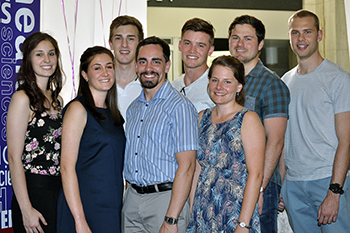Latest News Archive
Please select Category, Year, and then Month to display items
13 January 2020
|
Story Eugene Seegers
|
Photo Anja Aucamp
 Spearheading the digital expansion of the conversational Sesotho course is IDEAS Lab Director, Johann Möller (middle). With him are from the left: Prof Pule Phindane, CUT; Dr Brenton Fredericks, CUT; Bahedile Letlala, UFS Department of African Languages; and Dr Elias Malete, UFS Department of African Languages.
Spearheading the digital expansion of the conversational Sesotho course is IDEAS Lab Director, Johann Möller (middle). With him are from the left: Prof Pule Phindane, CUT; Dr Brenton Fredericks, CUT; Bahedile Letlala, UFS Department of African Languages; and Dr Elias Malete, UFS Department of African Languages.
For many years now, the UFS has been offering a one-year course in conversational Sesotho for staff members; this can then be followed up with the one-year course in advanced conversational Sesotho. The conversational Sesotho for students in the Faculty of Education was introduced in 2018 at the UFS.
The Central University of Technology (CUT) needed a conversational course for its first-year students and approached the Department of African Languages for the development of such a course. Living as we do in a multilingual country; this additional language skill opens doors and often hearts as well.
Using instructional design principles
However, the need was identified by both CUT and UFS to present this crucial information in a way that would be more appealing to digital natives as well as to those less familiar with technology. The Department of African Languages on the UFS Bloemfontein Campus, together with relevant departments from the CUT, approached the IDEAS Lab located on the UFS South Campus, since they already have a reputation for being a specialist on broadcasting and repackaging curricular content for digital presentations. The IDEAS Lab provided technical advice and built the multimedia programme, which will help the user to hear and practice phrases in Sesotho, using instructional design principles. The course will be available to both staff and students belonging to the two universities.
Room for growth
Johann Möller, Director of the IDEAS Lab, says this pilot programme will give both institutions the opportunity to test the use of multimedia for language acquisition. He adds, “Language is extremely complex, and we would like to expand this learning aid in the future.” In fact, the original design has room for growth built into it.
To keep things simple for the user and the building team, it was decided to start out with only four potential everyday scenarios where a staff member would like to speak Sesotho: Firstly, how to greet other persons from different genders; secondly, potential scenarios one might encounter in the university environment itself; thirdly, how to deal with situations at a hospital; and finally, how to use one’s language skills at a filling station.
Pronunciation is key
Each scenario contains three to four conversations that the learner can revise, along with images and audio that illustrate the situation and assist with correct pronunciation. The system does not allow the user to progress unless they have listened to the pronunciations of the sample sentences or phrases.
Further reading material and vocabulary lists are also provided, with the result that people who are using the programme can learn at their own pace. The authoring software Articulate Storyline was used to build the individual scenarios and each conversation or lesson within it. The lessons are also not dependent on an internet connection; they can be downloaded onto a flash memory drive and used offline.
UFS Faculty of Health Sciences celebrates its newly qualified doctors
2016-12-09

The UFS medical students who obtained their
qualifications Cum Laude are: front row: Dr Madeli Jonker,
Dr Corli Leonard, Dr Jacques Kok, Dr Kelly Fuller.
Back row: Dr Henco Nel, Dr Dan Holmberg,
Dr Rikus Hoogenboezem and Dr Ben van Niekerk.
Photo: Marie-Louise du Toit
“Kovsies’ doctors stand out. They go the extra mile. Go out there and be a true representative of Kovsies’ servanthood.” These were the words of Prof Gert van Zyl, Dean of the Faculty of Health Sciences, at the annual function that was held by the School of Medicine for final-year medical students.
The function celebrates students who have obtained their MB ChB degrees, becoming qualified doctors. Prof Van Zyl went on to congratulate the students for thriving in a difficult year. “From today onwards, your degrees are in the bag, and nobody can take that away from you,” said Prof Van Zyl.
Class of 2016 praised for their tenacity
A total of 116 students obtained the qualifications, and were acknowledged as the class that showed the most tenacity, commitment and dedication to their studies. Nine students obtained their MB ChB qualifications Cum Laude. The medical students will be graduating at the UFS Summer Graduations on 8 December 2016.
Henco Nel, Michael Linström, and Daniel Holmberg were recognised as the best overall performing students in the class of 2016. Nel received prizes for best student in the departments of Urology and Orthopaedic Surgery; Linström walked away with awards from the departments of Anaesthesiology, Family Medicine and Obstetrics and Gynaecology, and Holmberg in Internal Medicine, and Paediatrics and Child Health.